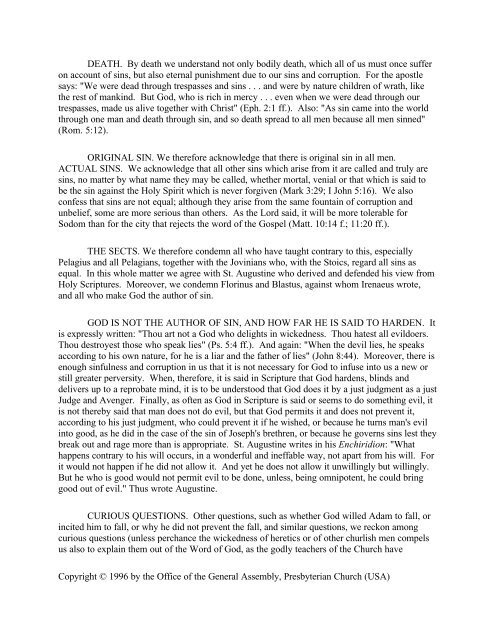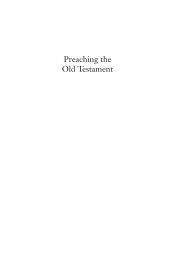The Book of Confessions - The Presbyterian Leader
The Book of Confessions - The Presbyterian Leader
The Book of Confessions - The Presbyterian Leader
Create successful ePaper yourself
Turn your PDF publications into a flip-book with our unique Google optimized e-Paper software.
DEATH. By death we understand not only bodily death, which all <strong>of</strong> us must once suffer<br />
on account <strong>of</strong> sins, but also eternal punishment due to our sins and corruption. For the apostle<br />
says: "We were dead through trespasses and sins . . . and were by nature children <strong>of</strong> wrath, like<br />
the rest <strong>of</strong> mankind. But God, who is rich in mercy . . . even when we were dead through our<br />
trespasses, made us alive together with Christ" (Eph. 2:1 ff.). Also: "As sin came into the world<br />
through one man and death through sin, and so death spread to all men because all men sinned"<br />
(Rom. 5:12).<br />
ORIGINAL SIN. We therefore acknowledge that there is original sin in all men.<br />
ACTUAL SINS. We acknowledge that all other sins which arise from it are called and truly are<br />
sins, no matter by what name they may be called, whether mortal, venial or that which is said to<br />
be the sin against the Holy Spirit which is never forgiven (Mark 3:29; I John 5:16). We also<br />
confess that sins are not equal; although they arise from the same fountain <strong>of</strong> corruption and<br />
unbelief, some are more serious than others. As the Lord said, it will be more tolerable for<br />
Sodom than for the city that rejects the word <strong>of</strong> the Gospel (Matt. 10:14 f.; 11:20 ff.).<br />
THE SECTS. We therefore condemn all who have taught contrary to this, especially<br />
Pelagius and all Pelagians, together with the Jovinians who, with the Stoics, regard all sins as<br />
equal. In this whole matter we agree with St. Augustine who derived and defended his view from<br />
Holy Scriptures. Moreover, we condemn Florinus and Blastus, against whom Irenaeus wrote,<br />
and all who make God the author <strong>of</strong> sin.<br />
GOD IS NOT THE AUTHOR OF SIN, AND HOW FAR HE IS SAID TO HARDEN. It<br />
is expressly written: "Thou art not a God who delights in wickedness. Thou hatest all evildoers.<br />
Thou destroyest those who speak lies" (Ps. 5:4 ff.). And again: "When the devil lies, he speaks<br />
according to his own nature, for he is a liar and the father <strong>of</strong> lies" (John 8:44). Moreover, there is<br />
enough sinfulness and corruption in us that it is not necessary for God to infuse into us a new or<br />
still greater perversity. When, therefore, it is said in Scripture that God hardens, blinds and<br />
delivers up to a reprobate mind, it is to be understood that God does it by a just judgment as a just<br />
Judge and Avenger. Finally, as <strong>of</strong>ten as God in Scripture is said or seems to do something evil, it<br />
is not thereby said that man does not do evil, but that God permits it and does not prevent it,<br />
according to his just judgment, who could prevent it if he wished, or because he turns man's evil<br />
into good, as he did in the case <strong>of</strong> the sin <strong>of</strong> Joseph's brethren, or because he governs sins lest they<br />
break out and rage more than is appropriate. St. Augustine writes in his Enchiridion: "What<br />
happens contrary to his will occurs, in a wonderful and ineffable way, not apart from his will. For<br />
it would not happen if he did not allow it. And yet he does not allow it unwillingly but willingly.<br />
But he who is good would not permit evil to be done, unless, being omnipotent, he could bring<br />
good out <strong>of</strong> evil." Thus wrote Augustine.<br />
CURIOUS QUESTIONS. Other questions, such as whether God willed Adam to fall, or<br />
incited him to fall, or why he did not prevent the fall, and similar questions, we reckon among<br />
curious questions (unless perchance the wickedness <strong>of</strong> heretics or <strong>of</strong> other churlish men compels<br />
us also to explain them out <strong>of</strong> the Word <strong>of</strong> God, as the godly teachers <strong>of</strong> the Church have<br />
Copyright © 1996 by the Office <strong>of</strong> the General Assembly, <strong>Presbyterian</strong> Church (USA)




